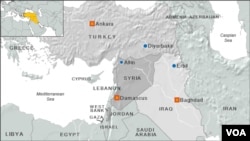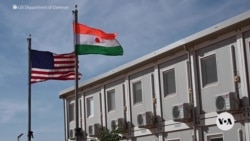The Britain-based Syrian Observatory for Human Rights, which has researchers throughout Syria, reports that recruitment of Syrian fighters for deployment to Niger has been going on for several months.
"We have confirmed that about 1,100 Syrian fighters have already been deployed to Niger since September of last year," said Rami Abdulrahman, director of the Syrian Observatory.
Syrian nationals are being recruited from areas under the control of Turkey and Turkish-backed Syrian armed groups in northwest Syria, Abdulrahman told VOA.
Syrians for Truth and Justice (STJ), a France-based advocacy group, said it has also documented such recruitments.
"These Syrian fighters are being transported from Syria into Turkey, and then using Turkish airports, they are sent [to Niger] by Turkish military airplanes," Bassam Alahmad, executive director of STJ, told VOA.
Turkey has in the past deployed Syrian fighters to other conflict zones, including Azerbaijan and Libya, through SADAT International Defense Consultancy, a private military company that reportedly has close ties with the government of Turkish President Recep Tayyip Erdogan.
"It's very clear that in Niger, Turkey is just extending a policy that views Africa as clear area of growth for Turkey in terms of commercial and military interests, and in terms of extending Turkey's power in the world," says Nicholas Heras, a Middle East expert at the New Lines Institute, a research organization in Washington.
Abdulrahman of the Syrian Observatory also said that SADAT was behind the recruitment of Syrian nationals from areas under the control of Turkey.
The Istanbul-based company declined to comment. VOA also contacted Turkey's Foreign Ministry but has received no response.
A Syrian fighter, who went by the name Ahmed, told AFP this week that a Turkey-backed Syrian militia called the Sultan Murad Division was involved in recruiting him for the Niger deployment.
The Syrian fighter, who was in Aleppo province, said new recruits will be trained at camps before participating in battles in Niger.
"The first two batches of fighters have already gone, and a third batch will follow soon," he said.
Another Syrian fighter told AFP that he was recruited for duty in Niger "on a six-month contract with a salary of $1,500."
A third Syrian fighter said that after two weeks of military training, he was tasked with guarding a site near a mine in Niger, according to AFP.
Syrian fighters have cited economic incentives as the main motive for accepting such job offers.
The Syrian Observatory said the Turkey-backed Syrian mercenaries have been stationed in the tri-border area between Niger, Mali, and Burkina Faso.
"For those getting wounded in battle, they receive up to $30,000 in compensation," Abdulrahman said. "For those getting killed, their families receive up to $60,000."
The United Nations says the tri-border region in recent years has become a major hotspot for insecurity, including terror activities carried out by militant groups.
This comes at a time when Nigerien and U.S. defense officials are discussing plans to withdraw all American forces from the country. Niger's military junta, which overthrew the country's democratically elected president in July of last year, has demanded an end to U.S. military presence in the country.
In December 2023, France also ended its military presence in Niger after a similar demand was made by the junta leaders.
Experts say Niger's junta recognizes a continued need for security support, so they are increasingly relying on mercenaries deployed by Russia and Turkey.
"France and the United States were security partners that were there supporting Nigerien forces through cooperation and agreements that didn't cost the Nigerien public significant tax dollars," said Daniel Eizenga, a research fellow at the Africa Center for Strategic Studies at the National Defense University in Washington. "Now upon their departure you have smaller contingents of Russian mercenaries, or these reports of Syrian mercenaries being sent by Turkey."
"You're just witnessing this very strange rhetoric around the reclaiming of national sovereignty by Niger's junta, which has no legitimate claim to popular political support, and then them ceding that sovereignty to these mercenaries and spending Nigerien tax dollars on hiring these groups whether they be Russian or Turkish," he told VOA.
Eizenga said the number of fatalities linked to attacks by Islamist militant groups in Niger has increased significantly since the junta took power in July 2023, arguing that coup leaders' interests are not aligned with national interests in Niger.
"The fact that they are inviting and courting these mercenary groups to come in is another example of exactly that," he said.
This story originated in VOA's Kurdish Service with some information from AFP.









